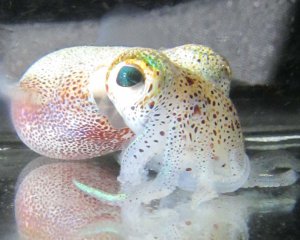MERRIT ISLAND, Fla. – The Hawaiian bobtail squid is a glowing example of aquatic symbiosis. It stands out as a unique cephalopod that lives with a light organ run by a luminescent bacterium, or microbes. The bacterium allows the squid to use light as camouflage against predators.
A team of researchers has received a $550,000 grant by the Gordon and Betty Moore Foundation to study the aquatic symbiotic properties in the squid for the next three years. Jamie Foster, principal investigator and UF/IFAS professor in microbiology and cell science is spearheading the project with Carlos Rinaldi, Dean’s Leadership Professor and chair of the department of chemical engineering, and David P. Arnold, UF’s George Kirkland Engineering Leadership Professor in the department of electrical and computer engineering.

Symbiosis is the interaction between two different organisms living in close physical association, typically to the advantage of both. The bacterium and the squid are symbiotic, which means the species lie together for mutual benefit.
“The objective of the project is to develop novel tools that will allow us to understand how microbes and animals are communicating at the cellular level,” said Foster.
Microbes are a vital part of an organism’s health to develop an immune system, for example. Understanding how microbes are communicating with the cells of a plant, animal, or human is important to understanding the health of that organism, said Foster.
“By learning the language that microbes use to communicate with their surroundings or animal or plant host, we can understand what the baseline health of the organism is,” she said. “You have to understand what is right before you can understand what is wrong.” Without microbes, we cannot develop properly. This research can help understand the balance between health and disease.”
The UF/IFAS team is one of 42 selected from around the world as emerging leaders advancing the frontier of aquatic symbiosis research. They are among nearly 200 highly specialized scientists participating in the foundation’s $19 million research investment. The project is called the Symbiosis in Aquatic Systems Initiative.
At the most basic level, the team will be conducting new cellular research.
To map out the exchange of information between the microbes and the host, Rinaldi will engineer nanoparticles in the form of tiny magnets that can track molecules inside the animal host. These magnets will allow the team to take images using a new biomedical imaging technology called magnetic particle imaging (MPI), distinct from magnetic resonance imaging in that it can precisely and quantitatively track the position of the magnetic nanoparticles. By taking MPI images of the squid, the team will be able to follow the communication that is happening in real time.
Arnold will develop the technology to move the magnets within the squid so the team can build novel magnetic tools that will unlock the mysteries of this micro-symbiosis. He will develop the electrical and magnetic hardware such as the electronics, magnetics, coils, amplifiers, and computer control to apply the magnetic fields to manipulate the magnetically tagged cells.
“Here, we are trying to understand the function and response of specific cells in the symbiosis,” said Arnold. “The instrumentation we develop will be at the forefront of magnetic nano-bioscience.” he said.
The proposed work is enabled by investments by the Herbert Wertheim College of Engineering and the J. Crayton Pruitt Family Department of Biomedical Engineering to acquire the state-of-the-art MOMENTUMTM magnetic particle imaging system that will be used to image nanoparticle and cell distribution, said Rinaldi.
-30-
By: Lourdes Rodriguez, 954-577-6363 office, 954-242-8439 mobile, rodriguezl@ufl.edu
The mission of the University of Florida Institute of Food and Agricultural Sciences (UF/IFAS) is to develop knowledge relevant to agricultural, human and natural resources and to make that knowledge available to sustain and enhance the quality of human life. With more than a dozen research facilities, 67 county Extension offices, and award-winning students and faculty in the UF College of Agricultural and Life Sciences, UF/IFAS brings science-based solutions
to the state’s agricultural and natural resources industries, and all Florida residents.
 0
0
